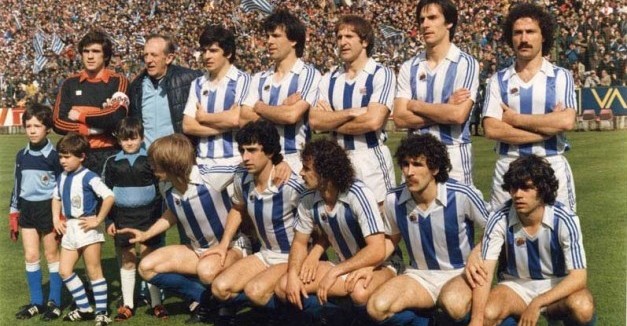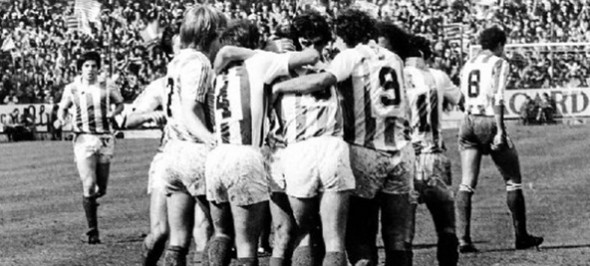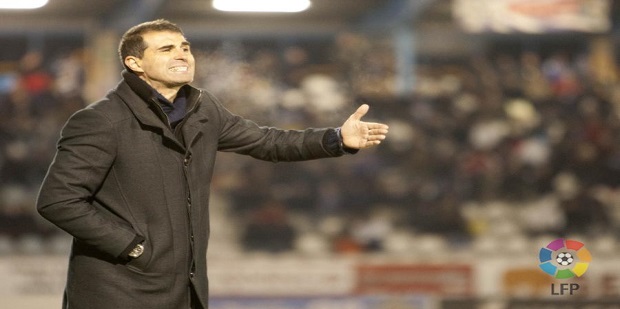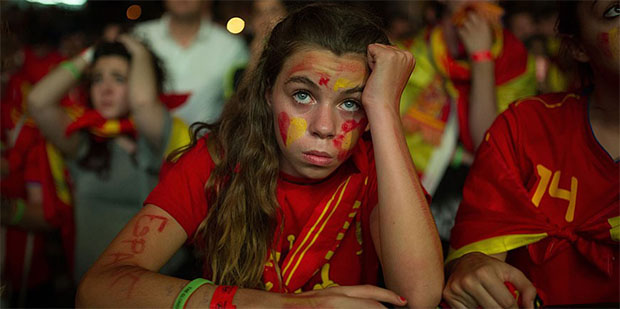- S.D. Eibar ready for maiden La Liga outing
- SD Eibar stengthen ahead of debut La Liga season
- Can ‘Super Mario’ live up to expectations in Madrid?
- MAN IN THE GROUND – Brentford 0 – 4 Osasuna
- Historic Basque derby welcomes S.D. Eibar to La Liga
- Munich to Madrid, via Brazil – Tony Kroos
- Rakitic in Spanish Switch
- Can Spain find redemption in Rio?
- Viva Espana! A season of redemption for Spanish football
- From the old to the new: who can fill the void in years to come for La Roja?
Basque Brilliance – When Real Sociedad shook-up Spanish football.
- Updated: 11 March, 2012

The period between the death of Generalissimo Francisco Franco in 1975, and 1982 when the elected left-wing PSOE governemnt brought full democracy back to Spain is known as La Transición.
This was a period of great excitement but also tense apprehension, as the many Spaniards wondered if their country could shake-off the legacy of a 36 year dictatorship and become of the modern, democratic world. Nowhere were these two emotions felt more acutely than in The Basque Country, where ETA were embarking on a campaign of armed-violence in an attempt to gain full independence for the region.
Although supported by a significant number of Basques at the time, most in the region were simply happy to be part of a democratic Spain again. A degree of autonomy had returned to the region where they were now free to celebrate Basque traditions, fly the ikurrina flag and speak in their own language without fear of persecution.
The 1970’s had not been a vintage decade for Spanish Football and during this period Real Madrid had been overwhelmingly dominant, making La Liga sterile and uncompetitive. Just as the country was experiencing the winds of political change, a revolution was also taking place in football. The main protagonists were from the lush green hills of The Basque Country.
However this wasn’t taking place in the traditional footballing stronghold of Bilbao, but up the road in Gipuzkoa in the beautiful costal city of Donostia (San Sebastián) – home of Real Sociedad. The seeds of this transition in footballing power had begun in the 1979-1980 season, when ‘El equipo Txuri-Urdin’ (blue and whites) under the command of Alberto Ormaetxea had remarkably remained undefeated for 32 games, only to lose 2-1 in the penultimate game of the season in Sevilla.
The loss in Andalusia meant Real Sociedad were tragically pipped at the post by the hated team from the capital. Real Madrid were lucky as ‘Er Reala’ as Real Sociedad are known in Basque, were widely considered to have played the best football. Their high-tempo style of play gave the side some great victories at their legendary old stadium Atotxa (a compact British style arena), including a 4-0 thrashing of Real Madrid.
Such a tragic end to the season could have destroyed a lesser group of players, but this team were made of stronger stuff and players who would become legends such as goalkeeper Luis Arkonada, dynamic midfielder Periko Alonso (the father of Xabi) and forward López-Ufarte were determined the following season to make amends and bring some joy to the long suffering Basque Country.
However season 1980-1981 didn’t start well with ‘Er Reala’ being frustratingly inconsistent and after a 2-0 defeat in the Camp Nou with just 10 games to go, the Basques found themselves six points off league leaders Real Madrid.
Perhaps with the pain of the previous season still fresh in the minds, the players re-grouped and would remain undefeated until the end of the season, while both teams from the capital started to drop points.
After winning away to Murcia in the second to last game of the season ‘La Real’ (please note the club are never known as just Sociedad in Spain) reached the submit of La Liga. A further victory at home to Español left the club on the brink of an historic first league title, but would the team throw it away again? Real Sociedad’s final game of the season was in Gijón against Sporting.
Sporting are from Asturias, a region that has traditionally held no great love for the Basques, yet Real’s fans with their newly un-banned Ikurrina flags took over the El Molinon stadium, in the hope of seeing their heroes crowned champions. The game couldn’t have started any better for La Real as they took the lead after only six minutes after a goal from Kortabarria.
Two goals from the home side however turned the game around one minute either side of half time, and the visitors found themselves trailing. Given that Real Madrid were winning away at Valladolid, it seemed that history was going to repeat itself. As the match drifted towards it’s finale, the Basque supporters were disconsolate.
In the final minute of the game however, Jesús María Zamora carved a name for himself in the history book when his thunderous right foot shot brought the sides level.
It was the goal that clinched the league title. Real Sociedad were champions for the first time and the starting XI from that deciding game can still be recited by fans today, even those that were not even born at the time.
Arkonada, Celayeta, Górriz, Kortabarria, Olaizola, Diego, Alonso, Zamora, Idígoras, Satrustegi, López Ufarte, José Mª Bakero and Larrañaga had become immortals.
Remarkably the team would win the title again the following season, with the added bonus of the decisive match being against Basque rivals Athletic, whom Real defeated 2-1. That summer Spain would host the World Cup, with players such as Arkonada and López-Ufarte in the squad. The tournament was a disaster for the Spanish.
The right-wing Madrid press looking for scapegoats laid part of the blame at too many Basques ‘who didn’t feel the colours’ representing the team. It was a sad sign that old prejudices in the country, despite ‘La Transición’,still ran deep.
___________________________________







One Comment
You must be logged in to post a comment Login